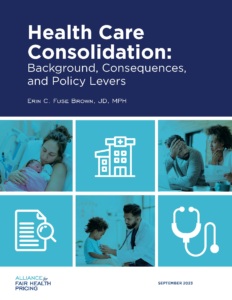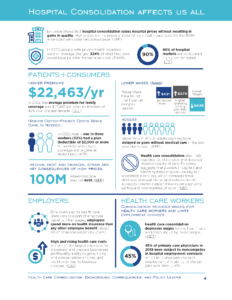Health Care Consolidation: Background, Consequences, and Policy Levers
Read the Full Report:
Erin C Fuse Brown, JD, MPH
Executive Summary
Rising health care costs affect every level of the economy, squeezing households, employers, and governments’ budgets. A key driver of excess health spending in the United States is the consolidation of the health care market — which increases health care prices for the privately insured.
Health care consolidation among hospitals, health systems, and physicians has been increasing steadily for decades. Driven largely by the financial rewards of growth and market power, the national market for health services is now dominated by a handful of mega-health systems, with nearly every market considered highly concentrated. Despite the theoretical benefits of health care integration, evidence shows that increasing levels of health care consolidation harm patients, purchasers, employers, and their communities without yielding meaningful benefits.
This report discusses the harms of consolidation in health care and possible policy options to address them. Key findings include:
-
Once begun, health care consolidation initiates a downward spiral: increased market concentration leads powerful systems to use their market power in anticompetitive ways to raise prices and weaken rivals. This, in turn, fuels more consolidation as smaller, independent providers may turn to the larger systems to survive.
-
Health care consolidation raises provider prices, which increases health spending through higher insurance premiums and out-of-pocket costs. The result is decreasing consumer affordability and higher health care costs for employers and taxpayers.
-
Health care consolidation does not meaningfully improve the quality of patient care and may diminish choice and access, especially in rural and underserved urban areas.
-
Rising health care costs driven by consolidation have significant economic impacts both nationally and locally, depressing wages, inhibiting job creation, stifling economic development, and reducing tax revenues.
Competition in health care markets is necessary to improve affordability and access for Americans. Several policy options can promote competition and blunt the effects of market consolidation, including:
-
Improving price transparency. Price transparency policies can counter the existing opacity of health care prices that prevent competitive pressure on high-priced providers. In addition to strengthening federal hospital price transparency and transparency in coverage rules, more data are needed to monitor consolidation activity and its effects on spending, quality, access, and practice patterns.
-
Strengthening antitrust oversight over health care consolidation. To limit anticompetitive consolidation, policymakers could strengthen antitrust laws to allow greater oversight of health care transactions. These efforts include: (1) increasing funding for antitrust agency enforcement; (2) combining the value of “serial” transactions to trigger review of smaller mergers and acquisitions that currently do not receive antitrust scrutiny; (3) eliminating the exemption for non-profits from FTC jurisdiction; and (4) increasing scrutiny over non-horizontal (vertical and cross-market) transactions.
-
Banning anticompetitive health plan contract terms. Dominant players can exploit their market power to demand anticompetitive terms in their service contracts, shielding themselves from competition to raise their prices. Policymakers can outlaw the use or threatened use of anticompetitive contract terms and render them void and unenforceable, including all-or-nothing contracting, anti-tiering and anti-steering clauses, gag clauses, and physician non-compete clauses.
-
Expanding site-neutral payment policies. To blunt incentives for and cost increases from vertical consolidation, policymakers at the federal and state levels should (a) expand site-neutral payment policy within and beyond Medicare to commercial insurance markets; and (b) ban unwarranted facility fees for physician office visits and for off-campus outpatient services.
It is critical for policymakers, purchasers, and anyone who consumes health care to grasp the urgency and magnitude of the problem of health care consolidation, which threatens both health care affordability and our ability to invest in a higher-quality, more equitable health care system.


